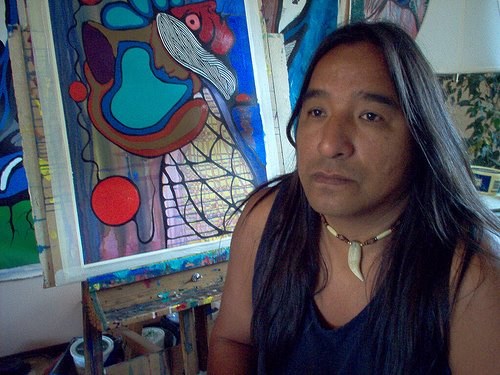THUNDER BAY — Family members of Moses Beaver described him as a kind and caring man whose life was tragically cut short because he was suffering from a mental illness and did not have access to proper care, a situation that is all too familiar for many Indigenous people and remote communities.
Beaver’s three sons — Jerome Beaver, Shallum Beaver, and Gershom Beaver — shared emotional statements during the coroner’s inquest examining the circumstances surrounding his death in 2017.
“There are memories I have of spending time out on the land with my brothers and my dad,” said Beaver’s youngest son, Jerome Beaver. “Thinking about all these things is hard and it’s difficult to remember a lot of stuff because of the trauma my family has been through. I do remember my father was a kind man.”
The inquest, now in its third week, has previously heard evidence that Beaver was suffering a mental health crisis in January 2017 in his home community of Nibinamik First Nation. Beaver had previously been diagnosed with depression and bi-polar disorder.
Attempts were made over several days to medivac Beaver out of the community to receive treatment but weather and higher acuity calls delayed Ornge aircraft. Beaver was then arrested by Nishnawbe Aski Police Service and transported to the Thunder Bay District Jail.
On February 13, 2017, Beaver was found in his cell with a bed sheet around his neck. He was transported to the Thunder Bay Regional Health Sciences Centre where he was pronounced dead.
According to Shallum Beaver and Gershom Beaver’s statements, when Moses Beaver was in custody at the district jail, they attempted to inform staff that he was experiencing a mental health crisis and needed to be placed under a suicide watch.
“We told the front desk that we needed to speak to the nurse and he needed to be monitored 24/7. I knew how important it was that he got the right help,” Shallum Beaver said.
“My family and my brother and I did everything we were supposed to do to help my father and we were not listened to, any of us. This is why we are here now.”
Gershum Beaver also spoke of a previous time Moses Beaver was arrested while experiencing a mental health episode.
“The police saw his mania and thought he was drunk and didn’t see him as an ill man,” he said. “I wonder whether a non-Indigenous person would be treated this way.”
According to Gershom Beaver’s statement, he and his brother tried to tell staff at the jail that their father needed serious help and that he should be transferred for the Thunder Bay hospital.
“She told us the district jail had their own doctors and psychiatrist that could help our father,” he said.
Gershom added that remote First Nation communities have no capacity to care for people experiencing a mental health crisis because of a lack of training and infrastructure.
“When I think about my father getting really sick in 2011 I remember there are laws in Ontario and Canada that are not created with Indigenous people in mind,” he said. “Since my father’s death, the legal system and how Indigenous people are looked after when they are ill hasn’t changed.”
Interspersed between statements from Moses Beaver’s three sons, video clips of him participating in education events in Southern Ontario and Wisconsin were shared with the inquest.
In the video clips, Beaver shares traditional knowledge relating to smoking moose meat and fish, as well as his love of traditional art and teaching youth.
“To encourage young artists you have to boost their self-esteem,” Moses Beaver said in one of the videos. “A lot on the reserve have low self-esteem. Not to discourage but to encourage. That’s my way of teaching. I give them the power of creation, which means I don’t tell them what to do. I give them the tools to use and show them my way of painting.”
Gershom said his father loved to teach and inspire children and he was a kind and caring person to everyone he met.
“My father was a good man with a good heart,” he said. “I saw him give to the poor on the street even if it was the last of his money. He was kind. He would often put others before himself and shared to others what little he had.”
Also called to testify on Thursday was Nishnawbe Aski Nation Deputy Grand Chief Anna Betty Achneepineskum, who spoke to the mental health crisis still ongoing in First Nation communities across the Northwest.
“It’s been a chronic issue. We have in our history in terms of the impacts of colonization and our people being displaced and suppression we’ve had in our life and I live very closely with those things,” she said.
“I’ve witnessed the severe impacts, the continuous trauma, the impacts it has, and the effects it has on our people.”
Achneepinskum said First Nation communities and Indigenous people continue to carry the weight of inter-generational trauma from the residential school system and family trauma that evolves into serious mental health issues for many.
“I believe that’s what happened with Moses and that him being deprived of proper medical services including a comfortable, safe house for him to be able live in, impacted him,” she said. “I wish that it happened different in his story because he was a very gifted artist.”
More resources for mental health care are needed in remote communities, Achneepineskum said, using the examples of safe rooms in nursing stations, more workers trained in psychiatry working in communities, and more transportation options for those experiencing a crisis.
“We continue to advocate for the federal and provincial government to address the disparity in terms of the lack of resources and services for First Nation citizens,” she said. “Because this is not just isolated to the citizens of NAN, this is right across Canada.”
The inquest resumes on Friday with an additional witness expected to testify.
